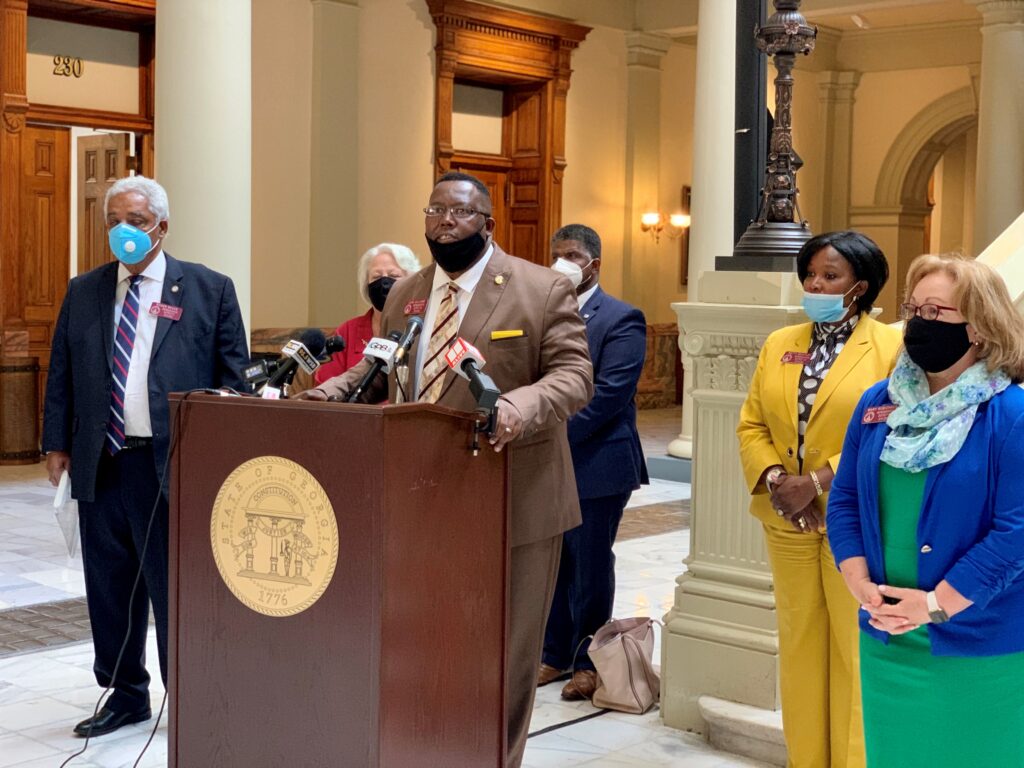
A Savannah lawmaker called for passage Thursday of legislation aimed at eliminating the Georgia’s citizen’s arrest law as part of a push for a new round of criminal justice reform amid nationwide protesting against police brutality and racial injustice.
House Bill 1203 would remove language from state law that allows private citizens to arrest someone who commits a crime in their presence or within their “immediate knowledge.”
It would also do away with language allowing a private citizen to make an arrest “upon reasonable and probable grounds of suspicion” that someone committed a felony crime and is trying to escape.
The bill, sponsored by Democratic Rep. Carl Gilliard, is among more than a dozen bills filed since Monday when the legislative session resumed that focus on court and policing reforms.
They include measures to repeal the state’s stand-your-ground law, prohibit police officers from racial profiling and ban no-knock search warrants.
At a news conference Thursday, Gilliard said and other House lawmakers supporting the bill called the citizen’s arrest law outdated and an incentive for untrained civilians to perpetrate violence on others.
“To move Georgia forward, our focus is prevention in reference to repealing this law so that we will have an opportunity for the law to do the law,” Gilliard said.
Rep. Mary Margaret Oliver, D-Decatur, said arrests should be left to law enforcement professionals and not “amateurs … [who] sometimes flow into the role of vigilante.”
“We need to understand that citizen’s arrest is dangerous more often than not,” Oliver said.
Sen. Michael “Doc” Rhett, D-Marietta, said he plans to file a “companion bill” in the Senate on repealing the citizen’s arrest law.
In the House, a separate bill has been filed by Rep. Jeff Jones, R-Brunswick, to legalize “citizen’s detainment” provisions that would allow citizens to hold someone suspected of committing a crime under certain circumstances until law enforcement officers arrive to make an official arrest.
The recently filed bills on citizen’s arrest come amid protests that have rocked the U.S. in recent weeks following the death of George Floyd, a 46-year-old black man who died in Minneapolis during an arrest in which an officer kneeled on his neck for several minutes.
The citizen’s arrest proposal also comes after arrests were made in the fatal shooting of Ahmaud Arbery, a 25-year-old black man who was gunned down during a pursuit by two white men near Brunswick in late February.
The two men, Travis and Gregory McMichael, have claimed they suspected him of committing burglaries in the Satilla Shores neighborhood where they lived. Friends and Family who knew Arbery say he was out for a jog.
The McMichael men were arrested on felony murder charges in early May, months after the shooting. Since then, many Georgia leaders and lawmakers have pressed for repealing the citizen’s arrest law and passing a hate-crimes bill, which has stalled in the Senate.
Georgia House Speaker David Ralston has cast doubt in recent days on whether any criminal justice-minded legislation would muster enough support to pass this session except for the hate-crimes measure, House Bill 426.
In the Senate, Lt. Gov. Geoff Duncan unveiled a different hate-crimes measure Wednesday that would impose tougher penalties than the House-passed bill but which has stirred fears the move could crater chances for any hate-crimes legislation to pass this year.